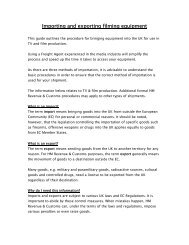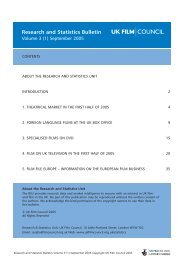The Economic Impact of the UK Film Industry - BFI - British Film ...
The Economic Impact of the UK Film Industry - BFI - British Film ...
The Economic Impact of the UK Film Industry - BFI - British Film ...
Create successful ePaper yourself
Turn your PDF publications into a flip-book with our unique Google optimized e-Paper software.
<strong>Economic</strong> Contribution <strong>of</strong> <strong>the</strong> <strong>UK</strong> <strong>Film</strong> <strong>Industry</strong><br />
July 2007<br />
<strong>The</strong> importance <strong>of</strong> <strong>the</strong> <strong>Film</strong> Tax Relief to supporting <strong>the</strong> continued success <strong>of</strong> <strong>the</strong> core <strong>UK</strong> film industry is<br />
clear when we consider how <strong>UK</strong> competitiveness would be affected if <strong>the</strong>re were no tax incentives from<br />
2008 onwards. In this case, <strong>the</strong> <strong>UK</strong>’s cost advantage vis-à-vis <strong>the</strong> US would fall to 15%. And <strong>UK</strong> film<br />
costs would be almost 25% higher than those in <strong>the</strong> Czech Republic over <strong>the</strong> remainder <strong>of</strong> <strong>the</strong> decade<br />
(Charts 11.3 and 11.4). We estimate that this loss <strong>of</strong> competitiveness would reduce <strong>the</strong> <strong>UK</strong>’s share <strong>of</strong><br />
global film production by around 9% points by 2010, to around 2%. That would be equivalent to a loss <strong>of</strong><br />
inward investment <strong>of</strong> about £650 million a year by 2010. In addition, investment in domestic production<br />
and co-productions would also be seriously undermined. Overall <strong>UK</strong> film production might be reduced by<br />
at least 75% by <strong>the</strong> abolition <strong>of</strong> <strong>the</strong> <strong>Film</strong> Tax Relief.<br />
11.3. <strong>The</strong> economic impact <strong>of</strong> <strong>the</strong> abolition <strong>of</strong> <strong>Film</strong> Tax Relief<br />
A decline in film production <strong>of</strong> that scale would have substantial economic effects:<br />
• It would reduce <strong>the</strong> direct contribution <strong>of</strong> <strong>the</strong> core <strong>UK</strong> film industry to GDP by about £1.1 billion and by<br />
£2.25 billion taking account <strong>of</strong> impacts on <strong>the</strong> supply chain and on <strong>the</strong> spending <strong>of</strong> workers who lose<br />
<strong>the</strong>ir jobs. Similarly, employment in <strong>the</strong> core <strong>UK</strong> film industry would be expected to fall by around<br />
25,000 jobs directly and 50,000 taking account <strong>of</strong> multiplier effects.<br />
• While many <strong>of</strong> those currently working in <strong>the</strong> core <strong>UK</strong> film industry would find jobs elsewhere and so<br />
continue to pay taxes, our research suggests that perhaps one-quarter <strong>of</strong> <strong>the</strong> most highly skilled would<br />
move overseas to be based in or near film production centres. As a result, <strong>UK</strong> GDP would be directly<br />
reduced by around £200 million a year.<br />
• Over time, tourism and exports would be undermined as <strong>the</strong>y lose <strong>the</strong> promotional support provided<br />
by <strong>UK</strong> films.<br />
• In addition, <strong>the</strong> <strong>UK</strong>’s cultural life would suffer as a result <strong>of</strong> <strong>the</strong> loss <strong>of</strong> <strong>UK</strong> films.<br />
• Overall, <strong>UK</strong> GDP would in <strong>the</strong> medium term be reduced by around £1.3 billion a year.<br />
• <strong>The</strong>se losses in turn would reduce Exchequer tax revenues by about £350 million a year, taking<br />
account <strong>of</strong> multiplier impacts and effects on merchandising. That compares with an estimated cost <strong>of</strong><br />
<strong>the</strong> new <strong>Film</strong> Tax Relief to HM Treasury <strong>of</strong> around £120 million a year.<br />
11.4. Conclusions<br />
<strong>The</strong> <strong>Film</strong> Tax Relief is vital to <strong>the</strong> continued success <strong>of</strong> <strong>the</strong> core <strong>UK</strong> film industry in a global environment<br />
characterised by stiff tax competition as countries seek to attract inward investment because <strong>of</strong> <strong>the</strong><br />
economic and cultural benefits that <strong>the</strong> film industry generates. <strong>The</strong> new <strong>Film</strong> Tax Relief provides <strong>the</strong><br />
basis for <strong>the</strong> continued growth <strong>of</strong> <strong>the</strong> core <strong>UK</strong> film industry. Without it, <strong>the</strong> core film industry would be<br />
expected to be 75% smaller, at a cost <strong>of</strong> £1.3 billion <strong>of</strong> lost GDP a year and around £350 million a year <strong>of</strong><br />
lower Exchequer revenues.<br />
71

















